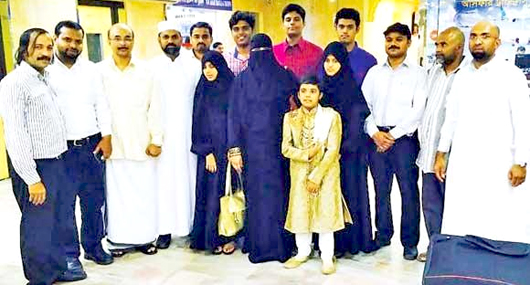
Riyadh, Jul 31: The ordeal of a stranded Indian family from Hyderabad finally came to an end with the climax being the wishful Eid Al-Fitr celebration with family and friends at home as they departed from King Khaled International Airport, Riyadh to India, celebrating the festival on Tuesday.
The Saudi government, the Indian Embassy in Riyadh, Shifa Al-Jazeera Hospital and some Indian social workers helped the family to go home after they could not facilitate their departure during the amnesty period due to non-availability of documents.
The saga of the family’s traumatic experience began with Mohammed Abdul Aziz from Hyderabad bringing his family here in 2000 and subsequently living illegally in the Kingdom.
Abdul Aziz, came to the Kingdom 19 years ago to work as an assistant pharmacist. He brought his wife Aneesa Begum and two children Hannan and Hadi on a family visa in 2000, but the same year he had a dispute with his employer and left his job to become a driver and do other small jobs for survival and livelihood.
However, he neglected to renew his iqama for 14 years and did not register his four children born in Riyadh subsequently — Noora, Aisha, Subhan and Mannan — due to poverty.
The children never went to school as they did not have proper documents like birth certificates.
However, they learned Arabic at home from their mother and could read the Holy Qur’an.
Aneesa Begum told Arab News that the family had not been able to make use of last year’s amnesty to return home. “We tried our best to get an emergency certificate to go home during the grace period but were unable to do so because we did not have the required documents.”
She said her husband had stayed illegally in the Kingdom because he wanted to support their poor family back home.
Luckily, Abdul Aziz’s sponsor never declared him an absconder (Haroob) although he had not been in touch with him for almost 15 years.
Abdul Aziz was subsequently held at the Shumaisi deportation center for several months after being detained in a routine inspection by the Riyadh police in the Batha area.
When he was arrested, the family faced further problems because their landlord evicted them for not paying the rent.
Furthermore, Abdul Aziz was facing separation from his family after languishing at the deportation center for months, but after the eviction from the rented house, the family stayed for some time at the SAPTCO bus stand in Azizia, where they were spotted by Indian social workers and eventually received aid from the Indian diplomatic mission, Shifa Al-Jazeera and Tarheel.
As the family requested assistance from the authorities to be granted final exit visas along with Abdul Aziz, their sole breadwinner, they received assistance from the embassy to return home on final exit visa on humanitarian grounds as they were without valid papers.
Indian Ambassador Hamid Ali Rao was regularly following the developments to facilitate the final exit for the stranded family, and embassy volunteer Shihab Kottukad along with other social workers helped the family get exit visas.
The family was moved to the Shifa Al-Jazeera polyclinic and provided initial accommodation.
Later, the embassy sponsored the family’s lodging and provided them with eight tickets to go home and transportation to the airport.
Shifa Al-Jazeera has also provided monetary help to the family amounting to 100,000 Indian rupees as financial assistance to enable them return home and resettle with family and friends.
Notably, the family celebrated Eid Al-Fitr here on Monday and reached home to participate in the festivities in Hyderabad on Tuesday, the day India and the rest of the world celebrated the festival sighting moon on Monday.





Comments
Add new comment